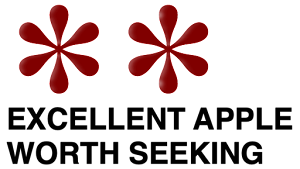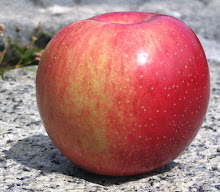 |
My photograph fails to do justice to this understated Vermeer of an apple, with its deep orange red blush peeping though a painterly coating of rusty brown.
These russets are medium-small and well-formed with a hint of ribbing. The russet covers most of the skin, which is silvery green except for the blush. Large irregular lenticels are most prominent in the unblushed areas and match the skin.
There are also smooth orange patches in the russet, though it's hard to say in which layer the source of that color lies.
Click on the photo for a close-up.
Orleans Reinette feels very firm in the hand. Its calyx is open and the skin--probably the russet--smells just a little like a cheese.
Though tender, almost to the point of mealiness, this apple still has a little crunch. The flesh is yellow and medium coarse and smells of pumpkin. It is flavorful without being terribly juicy.
This apple holds many complex flavors: first, a citrusy tartness well-matched with sweet; also refreshing acidity and notes of tangerine and honey. Then a nuttiness that asserts briefly, ending with a neutral vegetable taste from the peel.
 I confess that I found these tastes complex and challenging to unpack. Also, these are small.
I confess that I found these tastes complex and challenging to unpack. Also, these are small.
I tasted two samples and the flavors presented differently in each; one was drier and perhaps past its prime and the other had very little of the nutty effect, and smelled grassy rather than cheesy.
Is that too clinical? There is something about this intriguing and sophisticated apple that invites a cerebral analysis, so let me add: it's good.
But really someone should buy me a bag of these so I can tell you what I really think.
Juniper and Mabberly suggest that the word "reinette," which occurs in the names of many apples, does not derive from the French word for "queen" but rather from the Latin "renatus," that is "rebirth." An older source links it to an Old French word for "little frog."
In any case this fruit is not named for some diminutive royal lady of Orleans; one source says that this variety (which dates from the 18th century) was once known in Britain as Winter Ribston.

Hello Adam,
ReplyDeleteI've been looking at apple entries, in no particular order. Sometimes it's the name that draws me, other times it's the photo. This photo of this apple particularly drew me. The surface and colors of this apple are truly intriguing. Your description of its painterly coating is exactly what appeals to me. If an apple appeals is that some kind of pun?
It's an unusual variety and the appearance is striking. I find many of the russets very pretty in a whiskery rustic way.
ReplyDeleteDespite what I said about not doing justice, the original photo shows more detail and you can view it by clicking on the version posted above if you like. (That works with all of the photographs here, though some are little different from what gets posted.)
Apples ought to be a fruitful source of puns I think! Welcome.
Hi Adam,
ReplyDeleteJust a comment on Russets. In Oregon we have an apple show in October and last year we featured "Meet the Russets" with over 100 russet apples to taste (not all were totally russeted). One of my favorites to watch for is Hudson's Golden Gem, discovered 1931 in a fence row, near Hudson's Nursery, Tangent, Oregon. Most russets have "nutty' flavor. I understand that Hudson's Golden gem is being raised in the New England area.
That sounds like fun! I googled "Meet the Russets" and came a cropper. If you want to tell me about your apple events--you can drop me a line or leave a comment--I'll put them in a blog post.
ReplyDeleteWestern WI: I had to google “Meet the Russets” after reading this. I mostly got back hits on russeted potatoes. I’m guessing that potatoes being from the new world, the term “russet” as applied to them, comes from the apple side of things. Except: https://www.etymonline.com/word/russet#:~:text=russet%20(n.),%22red%2C%20ruddy%22). , where the term, russet is said to have originated from a term for a coarse wooden cloth and was applied to apples starting in the 1620s. Potatoes were introduced to Ireland in 1589 (by Sir Walter Raleigh), but took about 4 decades to get introduced to the rest of Europe (all this, according to a potato website). And who knows if the introduced potatoes were russeted? So maybe a case of parallel use? I’m surprised that the term “russet” was applied so late to apples. Anyway the top hit was a Facebook page, dressing up potatoes and comparing to the Brady Bunch.
DeleteWhere can I purchase organic orleans reinette apples?
ReplyDeleteThank you for your time.
Jane
Jane, Scott Farm says they grow them.
DeleteWestern WI: And in WI, Weston’s Antique Apples supposedly has them. I really have to try and make it there.
Delete